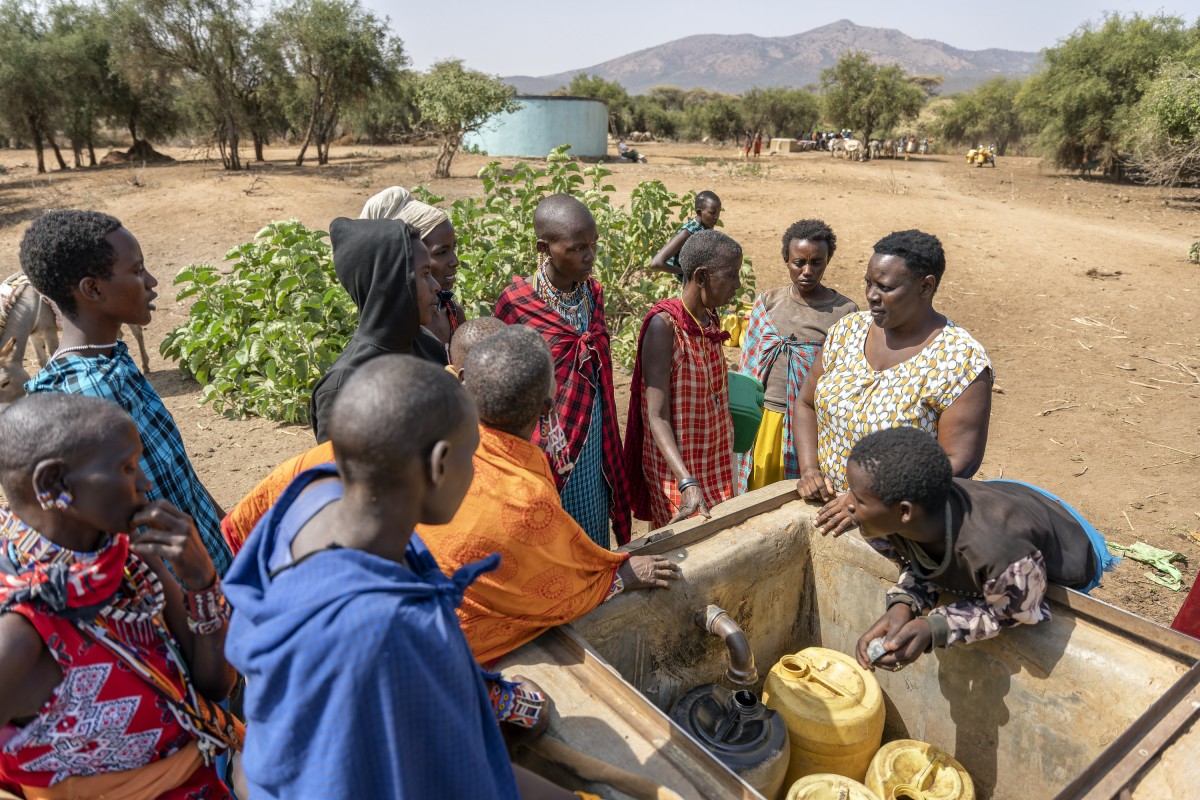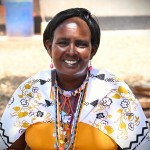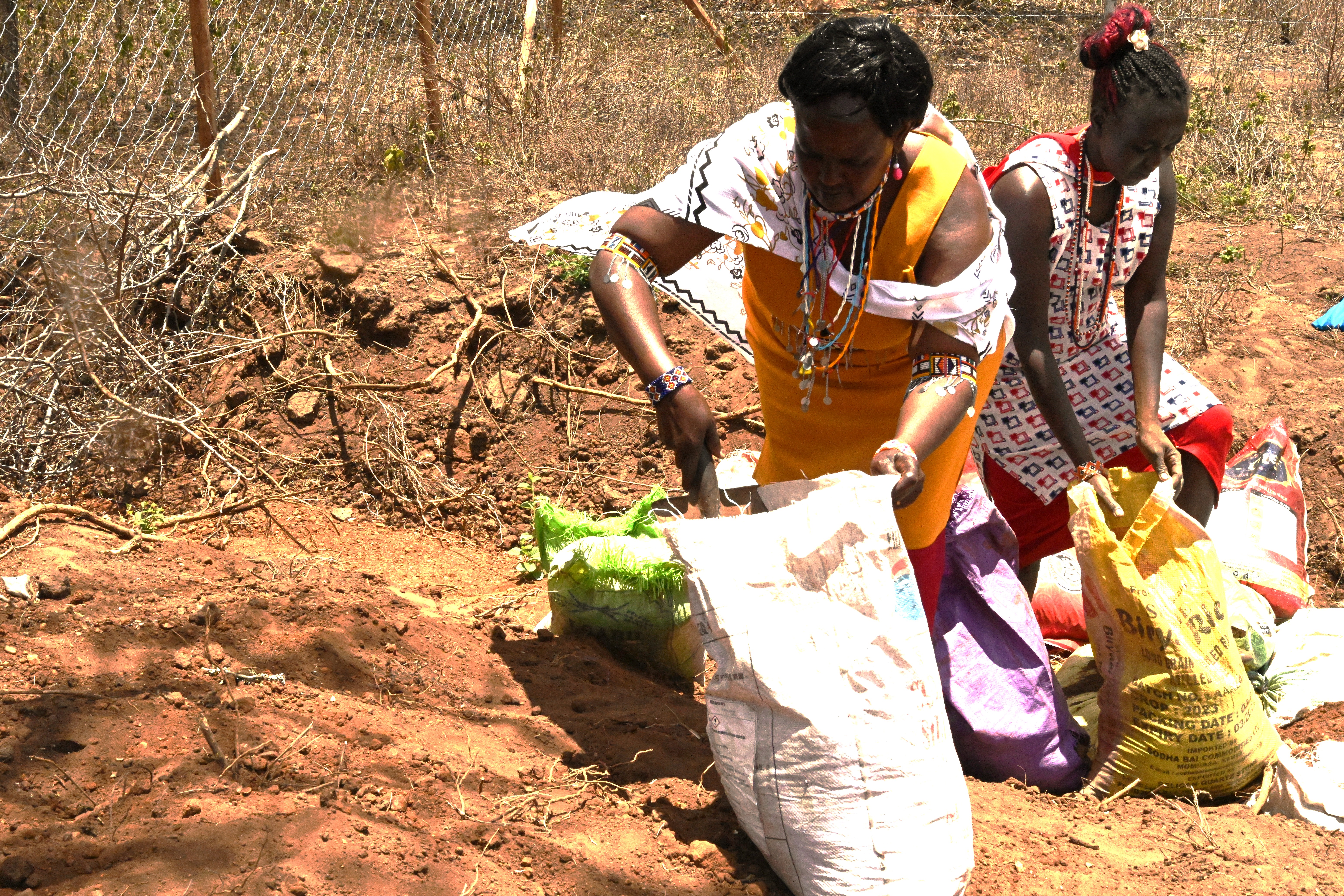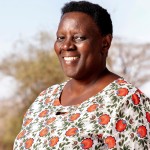Participatory peer learning inspires women groups to work together on water justice
Women groups in Kajiado County visit each other's projects, share ideas and results through WhatsApp and mentor new groups. Jane Nyamwamu, project manager at NIA, and Esther Kelempu, member of the Miton women group, explain how participatory peer learning strengthens women groups in Kenya.
‘Sharing experiences and solutions is something that is an integral part of the Water Justice Fund’, tells Jane Nyamwamu. Nyamwamu is the project manager at NIA, Simavi’s partner for the Water Justice Fund in Kenya. ‘We support participatory peer learning because it empowers women’s groups to actively engage in addressing water justice issues.’
One way of doing this is by organizing training sessions, where different women groups come together to discuss their challenges, ideas and successes. Esther Kelempu (55) is member of the Miton Naasho Olgos Women Group. She has a family, keeps livestock and tends a small kitchen garden.

Discussing challenges, ideas and successes
She remembers the last training session she attended: ‘It was great, we met in Olenarau, and women from five different women groups were present. We discussed a project of one of the women groups that works with a tokenized water system. We experienced that once we come together as a group, we can achieve our goals. Now I realize that I am part of important work. There even was an expert on agriculture from the county for advice!’
Nyamwamu recalls a session organised by the Naishorua Self Help Group and attended by nine other women groups. The session focused on how they could advocate for environmental conservation and the importance of protecting water catchments, as well as raising community awareness about the Sand Conservation and Quarrying Bill of 2024. ‘This is necessary in this area due to massive sand harvesting that is destroying water catchment leading to drying of rivers and lack of retention of water in the rivers.’

‘We experienced that once we come together, we can achieve our goals’
Mentoring in proposal writing
Another way that women groups learn from each other is that they become each other’s mentors, explains Nyamwamu. Experienced groups provide guidance to newer ones, creating a supportive environment. ‘For example, Naishorua Self Help Group, along with Engape and Miton Women Group, assisted other groups in proposal writing for the Water Justice Fund. This mentorship enables newer groups to understand the Water Justice Fund and put forward relevant fundable proposals.’ Even if they do not get funded by the WJF, it can still serve as an eye opener on how they can navigate challenges more effectively, is her experience.
Peer learning does not only happen at meetings but is also facilitated by digital platforms. WhatsApp groups have proven to be an effective method of keeping in touch with each other. Esther Kelempu tells how she is sharing pictures and videos of what they are doing with the other women groups. ‘For example, when we are excavating the earth pan that we are working on.’

Asking questions through WhatsApp
Other groups are also sharing experiences through WhatsApp. ‘I like to look at them to motivate myself. If my friends are doing well in the projects they share, I also want to be better in my own project.’ The WhatsApp group also proves to be useful to ask questions to other group members. ‘We learned a lot on proposal writing from the Naishorua and Engape women groups.’
Experiences with peer learning have been encouraging, says project manager Jane Nyamwamu. ‘Women’s groups have reported significant improvements in their confidence and skills.’ That also applies to the Miton Naasisho Women Group that Esther is part of, tells Nyamwamu. ‘Before they submitted their proposal for support, they visited Naishorua to learn on how the tokenized water system functions. This visit gave them the courage to reach out to the Water Justice Fund themselves and undertake their project on constructing an earth pan.’

‘Participatory peer learning empowers women groups to actively engage in addressing water justice issues’
More impact through peer learning
She is convinced that peer learning significantly contributes to the success of women’s groups. ‘By enhancing their knowledge and skills, by fostering a sense of solidarity, and by stimulating innovation. By learning from one another, these groups can implement more effective projects and strategies, making their efforts more impactful.’
Sharing experiences and solutions enhances community engagement and builds local capacity. And by encouraging collaboration, the Water Justice Fund cultivates a culture of teamwork and mutual support, enabling those directly affected by water challenges to develop effective strategies and advocate for their rights, says Nyamwamu. ‘Women’s groups have successfully lobbied for policy changes in water conservation, and the connections established through peer learning have paved the way for broader coalitions advocating for water justice. This collaborative effort marks the beginning of a powerful movement among these women’s groups.’
What is the Water Justice Fund?
Millions of women and girls are hit hard by the water and sanitation problems caused by climate change. Simavi’s Water Justice Fund supports women groups in Kenya, Nepal and Bangladesh to realize locally led solutions to water and climate challenges through participatory grant making. Creating spaces for ongoing mutual learning and engagement creates an opportunity for women groups to play a role in defining what success looks like and be part of the participatory monitoring and learning.


